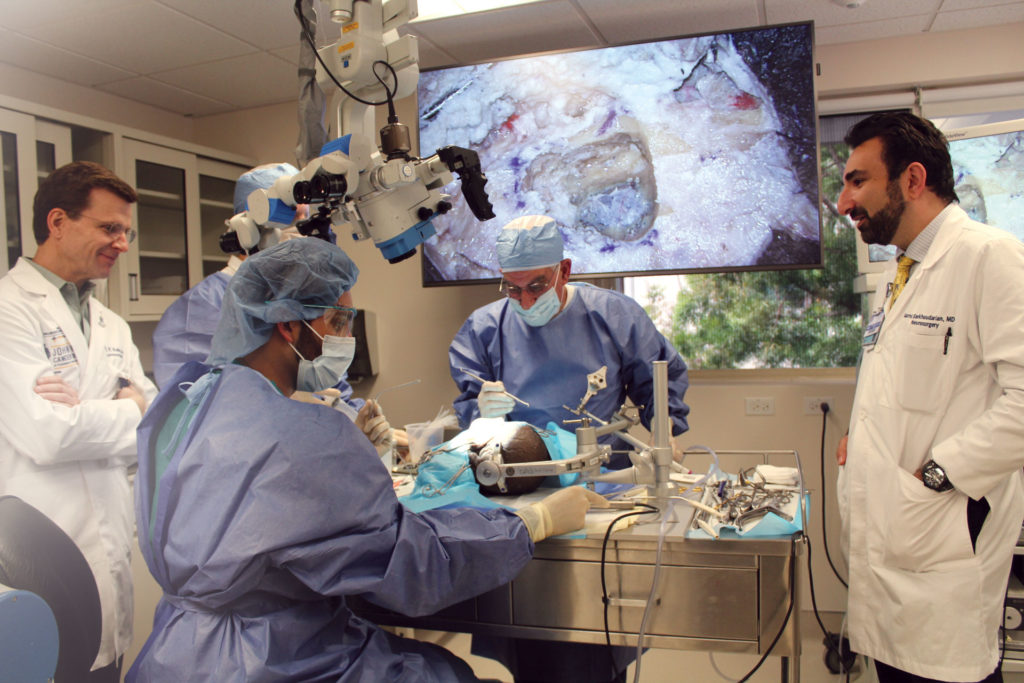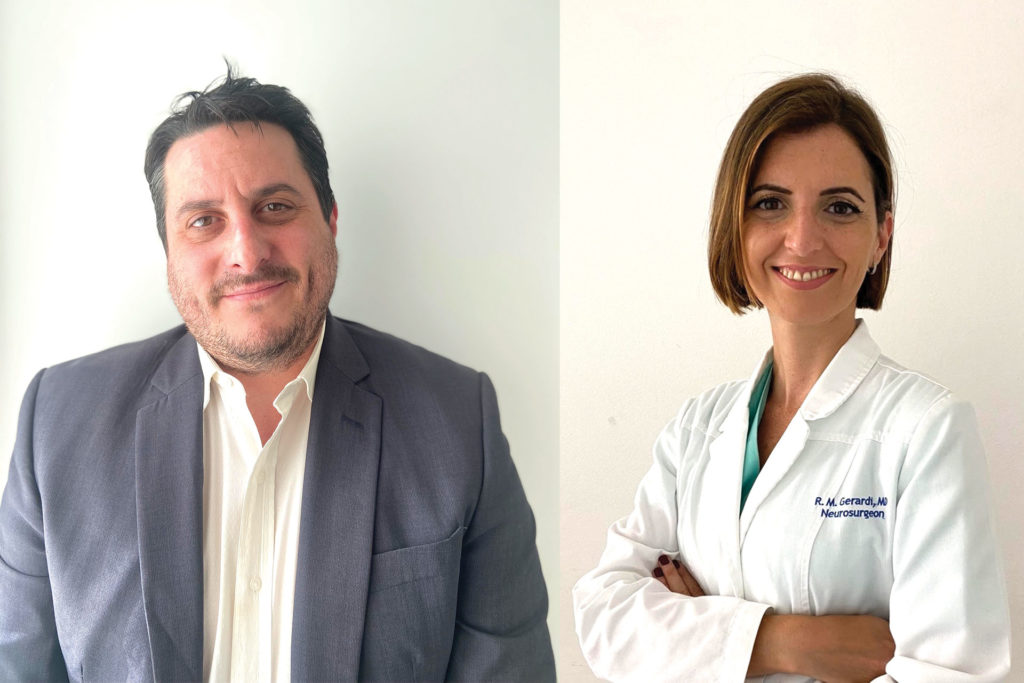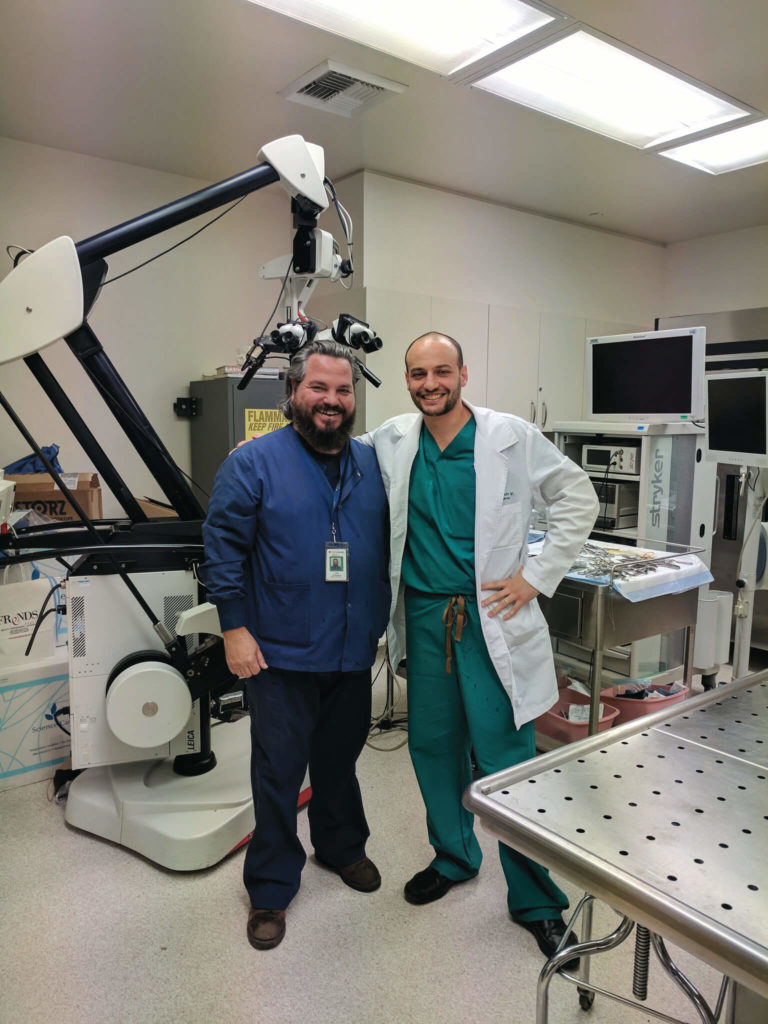Making New Connections
THE MULTIDISCIPLINARY NEUROANATOMY AND SURGICAL SKILLS LABORATORY IS AN INTERNATIONAL HUB FOR SURGEONS STRIVING TO EXPAND THEIR SKILLS.

BY MELANIE ANDERSON
At any given time, it’s not unusual to find surgical fellows from several countries, as well as other U.S. medical centers, observing and working alongside the highly skilled surgeons of Saint John’s Cancer Institute and Pacific Neuroscience Institute (PNI). The Multidisciplinary Neuroanatomy and Surgical Skills Laboratory at Saint John’s Cancer Institute has become a leading destination for neurosurgeons from around the world to conduct research and gain knowledge and hands-on experience.
“It’s very rewarding to have such a multinational group of individuals that come through our lab and come to our clinic on a regular basis, and it really expands our knowledge base with regard to how things are done in other countries,” says Garni Barkhoudarian, MD, associate professor of neuroscience and neurosurgery and director of the Microdissection Anatomy Laboratory. “It allows Saint John’s Cancer Institute and PNI to expand our reach. It puts us on a global playing field, and there’s a lot of value there.” A major part of the lab’s mission is providing neurosurgeons with a safe environment for practicing highly complex procedures—which they might not have mastered in their initial training—on cadaver specimens.
“The anatomy lab is the best opportunity to see what you’re going to see in real life. These labs allow for surgeons to perform these techniques with surgical instruments that would be very similar to how it would be in the operating room,” says Dr. Barkhoudarian. “The ability to help other surgeons in expanding their knowledge and being able to do these complicated operations in a safe and effective manner is not just benefiting our physicians, but it’s also benefiting patients locally, regionally and internationally.”
While labs for studying anatomy and developing neurosurgical skills aren’t uncommon, it’s the state-of-the-art technology, multidisciplinary emphasis and a robust fellowship program that set the lab at Saint John’s apart.
PUSHING BEYOND BOUNDARIES
Pacific Neuroscience Institute offers two fellowship programs—one for surgeons based in the U.S. and one for surgeons from international institutions. “We have the clinical fellowship, which is for a United States-trained neurosurgeon who wants to spend one additional year perfecting their art and their craft in minimally invasive and endoscopic surgery,” says Dr. Barkhoudarian. “It’s a joy to see somebody pushing their boundaries and learning how to do something that they haven’t been able to do before. It’s very rewarding to have that type of fellowship, and those bonds last forever. It’s been fantastic working with our colleagues after they’ve graduated.”
The international fellows typically spend three to six months at Saint John’s and PNI, observing complex neurosurgical procedures and working in the lab. “This is a really great opportunity because they can spend a concentrated amount of time practicing surgical approaches and techniques, and then they’re able to apply that when they go back to their home countries,” says Dr. Barkhoudarian. Rosa Maria Gerardi, MD, a consultant neurosurgeon at the neurosurgical clinic of University Hospital Policlinico Paolo Giaccone in Palermo, Italy, spent three months at Saint John’s in 2018. A typical day included morning rounds to check patients followed by an observational session in the operating room and lab dissections. Like other fellows, she also had the opportunity to contribute to research.
“The lab is fully equipped with the latest technological devices in order to reproduce faithfully a ‘real-life’ operating room environment,” says Dr. Gerardi. “This is truly helpful since, intuitively, the more the dissection conditions are adherent to reality, the more you can learn and grow as a surgeon.”

Dr. Gerardi’s fellowship experience inspired her committment to professional growth. “I have strongly reinforced my education as a resident, learning to always look for the highest level of surgical performance. It also reinforced the importance to create a strong bond of trust with patients and, last but not least, the central role of teamwork,” she says. Artur Khachikyan, MD, PhD, who heads the Department of Neurosurgery at Erebouni Medical Center—Armenia’s largest medical institution—appreciated being able to observe and then replicate operations in the lab. “After you see any stage of the operation in a real operating room, it is possible to repeat it in the laboratory and there is an opportunity to ask the surgeons the questions that have arisen,” he says.
“This is an invaluable experience.” After visiting the lab in 2018 and again in 2019, Dr. Khachikyan changed his approach to skull base operations because minimally invasive surgery is often much better for patients, minimizing risks and shortening recovery time. “I began to use widely the neuroendoscope and the minimally invasive keyhole technique,” he says. “Thus, you can gradually switch from surgery with a microscope to an endoscope. This favorably distinguishes my technique of work from colleagues and is a new step in my career as a surgeon.”
Dr. Khachikyan says he hopes all his residents can someday visit the Multidisciplinary Neuroanatomy and Surgical Skills Laboratory and work with Dr. Barkhoudarian; PNI director and cofounder Daniel F. Kelly, MD; and lab manager/medical illustrator Josh Emerson. When Pablo Barceló, MD, visited the lab in 2019, he was struck by its welcoming environment. “Josh Emerson was there for any need, and the proximity with the OR and resources made it easy to fulfill the concept, ‘from the lab to the OR,’” says Dr. Barceló, director of skull base and pituitary disorders at Hospital Rawson in San Juan, Argentina. “Dr. Kelly and Dr. Barkhoudarian were committed to including me in all of the activities. Nurse practitioner Amy Eisenberg is a very warm person who is willing to help you in all of your needs. All the staff made me feel comfortable and included me as one more.”
He adds, “If you spend hours in an incredible lab, if you spend hours watching incredible surgeons performing minimally invasive procedures and everybody cares about you learning, it’s impossible not to improve as a surgeon.” Fellows typically return home with not only advanced surgical skills but also an inspiring model for teamwork and patient care. “The lessons and the professional example of the faculty changed the way I see my vocation in several positive ways,” says Felipe Sfeir, MD, a neurosurgeon at Hospital Puerto Montt in Chile. “It is an intensely collaborative team in function for the patients, where each one of the parts dialogues fluidly with the others. Since my fellowship in 2017, I have been working to emulate the same spirit in my team.”

EXPANDING OUR REACH
Without the generosity of donors, the Multidisciplinary Neuroanatomy and Surgical Skills Laboratory and the outstanding educational and research opportunities it provides would not exist. “These labs are primarily for education, and as a result there’s a cost to it,” says Dr. Barkhoudarian. “The vast majority of the funds for the establishment of the lab, as well as the day-to-day functioning of the lab and the support of our fellows, comes from philanthropy. We owe a debt of gratitude to our Saint John’s Health Center Foundation donors.” Dr. Barkhoudarian notes the lab has also received approximately $1 million worth of equipment from industry partners since the lab’s mission includes testing and developing new surgical devices.
Another source of pride is the lab’s commitment to offering multidisciplinary courses that advance knowledge of anatomy and surgical approaches. As the lab continues to expand its course offerings, increased philanthropic support is needed to allow for hiring additional staff. “Our goal is to make connections to avoid each discipline working in silos,” says Dr. Barkhoudarian. “The lab is open to any Saint John’s Cancer Institute faculty if they want to utilize it for research or for courses. We’ve worked with the thoracic surgery team for a course and found that to be very helpful. We provide surgical anatomy education for the institution.”
Another goal is to establish an endowment to support a need-based stipend for international fellows. “I would love to have a fund that would support one or two fellows at a time such that we can continue this and really expand to physicians who don’t have the means to take time off from work and spend time with us,” says Dr. Barkhoudarian. “We have a lot of pride in this amazing, small but powerful hospital and network of physicians and caregivers, and we want to continue training and educating physicians who will in turn save more lives here and all over the world.”
